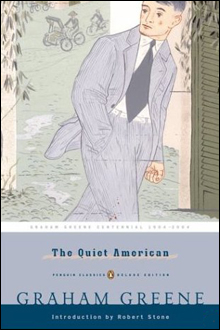
THE FIRST VIETNAM NOVEL: Greene's The Quiet American |
When I first saw Graham Greene, he was lunching outdoors with his longtime mistress at Chez Felix, Greene’s favorite restaurant in the old French port of Antibes. It was early October of last year and sunny, and he was wearing a long gray coat against a hint of autumn coolness.I knew he hadn’t been feeling well and I happened across him by coincidence —several hours in advance of our as-yet unconfirmed meeting — so I curbed my inclination to interrupt his meal with an aggressively friendly American hello. By now, after months of pursuing an interview, I’d learned that Greene valued his privacy. Although I’d always thought of him as a citizen of the world, as I spied him from a distance he looked very much the Englishman abroad, armed with a typically English shield of inaccessibility to ward off the casual intruder.
This chance encounter allowed me to view him in a way I could not, later on, in his apartment. I sat down on the lip of an old well about 30 yards away and observed the “great man” of 20th-century English letters. The first thing I noticed were his eyes, which seemed to be staring into a wide middle distance, absorbing everything. He looked his age, but his eyes somehow had the power of a much younger man.
It was, it turned out, the eve of his 86th birthday. I didn’t want to think it would be his last. Later, when he and his companion got up to go, they made their way slowly across the street. He couldn’t be that ill, I thought. But he was; he died a few months later, and I believe our conversation that night was his last interview.
It occurred to me that Greene had seen nearly all of the 20th century and could perhaps relate it to me in epic style. But I concluded that ascribing such powers to Greene would strike him as absurd and pretentious; this was a writer whose strict attention to the details of human existence has made him wary of the grand generalization and the overarching theory, even when the subject was God or his church.
As a writer, Greene had done virtually everything that could be done. His novels are universally acclaimed and brought him not only literary distinction but also the status of a sort of sinner’s theologian. Though he resisted religious categorization, he was easily the most important Catholic novelist of the century. That Greene never won the Nobel Prize for literature has always struck me as proof that Alfred Nobel’s original sin - the invention of dynamite - has permanently corrupted his memorial.
But Greene did far more than write good fiction. His travel book, Journey Without Maps, about his voyage on foot through Liberia in 1934, is a classic. As a journalist, he covered wars in south East Asia and Africa and interviewed such revolutionary figures as Fidel Castro, Ho Chi Minh, and Salvador Allende. He wrote plays, short stories, essays, and successful screenplays.